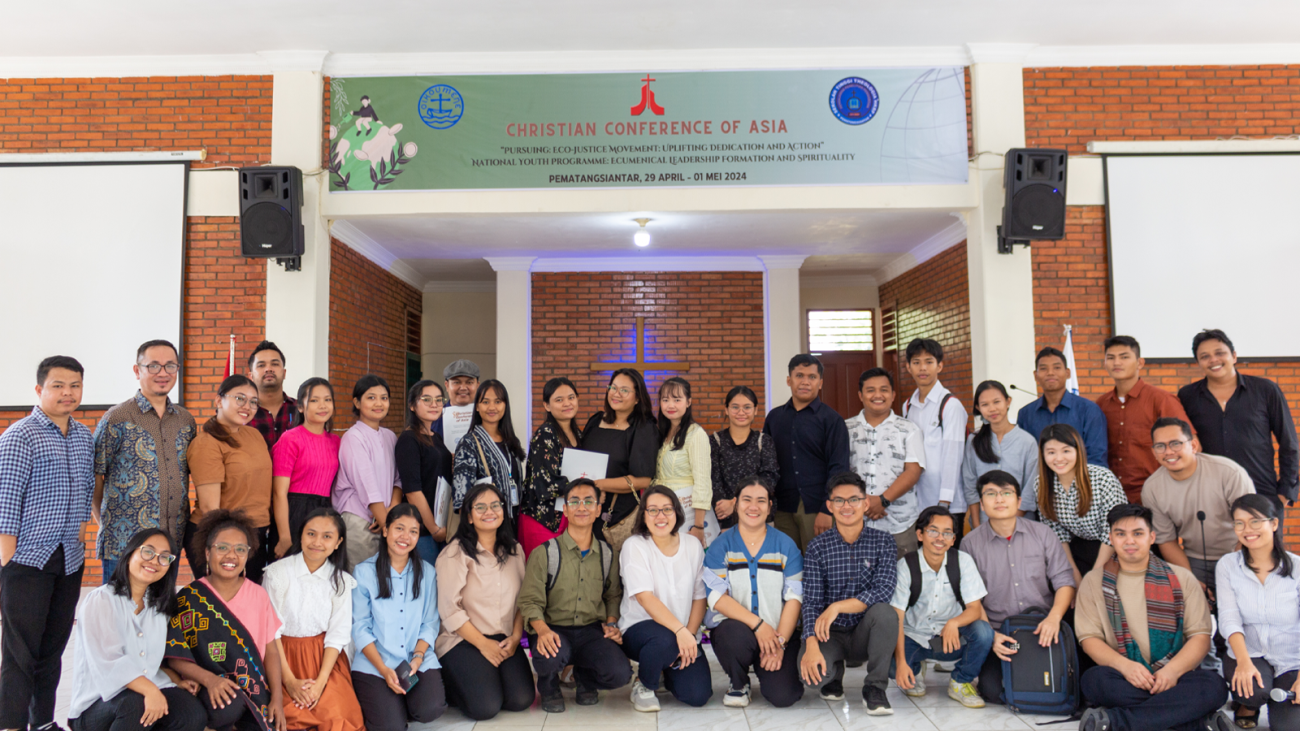Ecumenical Youth Programme in Indonesia focuses on Eco-Justice and Care for Creation

Participants of Ecumenical Youth Training Programme
Siantar, Indonesia: An ecumenical youth training programme organised by the Christian Conference of Asia (CCA) with the participation of CCA member churches in the North Sumatra region in collaboration with the youth desk of the Communion of Churches in Indonesia (CCI) focused on the theme eco-justice and care for creation.
The three-day training held from 29 April to 1 May 2024 at the Sekolah Tinggi Theologia of the Huria Kristen Batak Protestant (STT HKBP) at Pematangsiantar, Indonesia was attended by forty participants from across the region.
Rev. Dr Sukanto Limbong, President of the theological seminary - STT HKBP who greeted and welcomed the participants highlighted how special it was for young leaders from different church backgrounds to come together as a unified community to address the emerging concern and pressing need of the hour, eco-justice and care for God’s creation.
Stressing the importance of eco-justice in today’s world, the gathering of young Indonesian Christians would be helpful in fostering collaboration, dialogue, and collective action towards sustainable environmental practices and eco- justice; said Dr Limbong.
Rev. Septhian T. Sijabat of the National Committee of Lutheran churches in a biblical-theological reflection based on Genesis 1:26-28 and 2:15, explored humanity's connection with the environment, emphasizing the essence of the image as the love for all creation.
The theological reflection session underscored humanity's interconnectedness with the natural world, reinterpreting the concept of dominion and highlighting its true meaning of responsible care and preservation of creation rather than exploitation, and recognizing it as a divine mandate rooted in the image of God.
"God created the environment not just for our benefit but also entrusted us with the responsibility of its care. We have been given the power, but it is our duty to wield it responsibly. If we are human beings, we bear responsibility in the ecological movement," said Rev. Sijabat.
Rev. Dedi Pardosi of the HKBP presented an overview of the History of ecumenism, both global and Asian context. Emphasizing the significance of youth in the ecumenical movement, Rev. Pardosi underscored the importance of respecting differences.
"In the ecumenical movement we encounter a multitude of differences in doctrines, values, and principles. Our commitment to respecting other traditions is paramount, as failure to do so can lead to conflicts, " stated Rev. Pardesi, who once served as a youth programme intern at CCA.
Dr Lalthanmawia led a discussion on the intricate relationship between human, animal, and environmental health, highlighting how disruptions in one area can impact others. The conversation delved into pressing health challenges in Asia, including disparities in public health spending and the urgency of addressing diseases like HIV and AIDS, especially the spread of HIV among young people in Asia.
"In the realm of health and healing," said Dr Lalthanmawia, "the '3 H's'—Head, Heart, and Hands—symbolize key aspects. The Head signifies knowledge, empowering informed decisions. The Heart embodies empathy, recognizing emotional and spiritual well-being. Finally, the Hands represent action, translating knowledge and empathy into tangible deeds for holistic wellness. Together, these '3 H's' reminds us that true health and healing require a holistic approach that engages the mind, the Heart, and the Hands in harmony."
The exploration of crucial issues and fostering of leadership within the communities of the participants were also part of the training sessions.
Participants’ engagement in a contextual bible study titled "Dwelling in Harmony with God’s Creation," helped to generate deep discussions and enabled reflections on humanity's role as stewards of creation and on ways to effectively convey the message of stewardship and harmony with nature.
Manuel Simbolon of the World Christian Student Federation (WCSF) facilitated a workshop on Climate Change and Globalization. Rising temperatures and extreme weather conditions, like tornadoes in Indonesia and floods in Dubai, underscore the urgent need for action. He opined that while industrialization in the Global North historically drove climate change, ongoing development in the Global South exacerbates the crisis.
A panel discussion on (theme) facilitated by Rev. Berman Maeda Situmorang of the Christian Protestant Church in Indonesia (GKPI) and Mikhael Sihotang (Huria Kristen Batak Protestan) highlighted the need for actions such as encouraging organic farming initiatives in villages.
Dr Melinda Siahaan, of the Institut Agama Kristen Negeri (IAKN) Tarutung, led a session with focus on empowering ecumenical youth leadership and navigating intergenerational dynamics within church communities.
Dr. Siahaan delved into pressing intergenerational issues, highlighting the metaphor of "Haminjon" (Frankincense) as a symbol of eco-intergenerational friendship amidst significant deforestation in Sumatra.
Ester Kristina Purba of the Indonesian Christian Church (HKI), addressed the church's response to environmental needs and youth concerns, emphasized the vital role of young people as pillars of creation care and response to it. Ms. Purba also raised concerns about environmental degradation and pollution, and she urged greater collaboration between generations to address these pressing challenges.
Mikhael Sihotang emphasized the importance of churches responding to environmental needs and youth concerns, urging for solidarity and clear communication between generations.
Various sessions also addressed challenges faced by youth in advocating for change within church systems, including obstacles posed by elders and limited opportunities for participation. As discussions concluded, participants expressed their commitment to translating insights gained from the session into concrete actions, including Earth Day initiatives and ongoing community engagement projects. The session underscored the vital role of ecumenical youth leadership in driving environmental stewardship and promoting intergenerational collaboration within church communities.
Photo Gallery, please click here: Ecumenical Youth Training Programme, Pematangsiantar, Indonesia 2024










